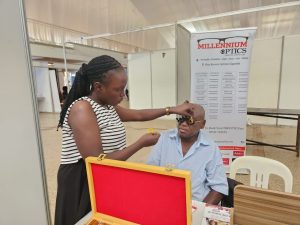Thousands of Ugandans are turning up at the Uganda Manufacturers Association (UMA) Show Grounds for the ongoing Family Health Expo, a three-day event providing free medical checkups, medication, and health education to citizens.
The expo, organized by Copius Health Services, in partnership with the Ministry of Health, has brought together public and private health providers under the bold theme “Innovating Health to Overcome Funding Gaps and Advance Preventive Healthcare through the Private Sector.”
The event opened with a high-level health symposium attended by policymakers, health professionals, civil society actors, and development partners. 
Discussions largely centered around Uganda’s need to develop sustainable domestic resource mobilization strategies for healthcare following the recent suspension of health aid by the United States.
During his opening address, Brian Bogere of Copius Health Services emphasized that this year’s expo is unlike any other previously held, describing it as a strategic response to the ongoing health aid cuts affecting Uganda.
“We are responding to the aid cut that our nation is facing. But I believe Uganda has all the resources we need for as long as we collaborate and work together. We can overcome financial disparities and ensure that every Ugandan has access to not just any healthcare, but affordable and inclusive healthcare,” he said.
The Expo is offering a wide range of free services including general health screenings, dental checkups, maternal consultations, eye testing, and vaccinations.
Hospitals, clinics, pharmaceutical companies, and NGOs are all showcasing innovations aimed at building a culture of prevention and resilience.
Sr. Mary Grace Akiror, from the Office of the President, who officiated the opening ceremony as the chief guest, challenged Ugandans and policymakers alike to take action over rhetoric.
“What do we prioritize? Campaigns? Politics? But do we prioritize health?” she asked. “Let this be a wake-up call. We must act now not tomorrow and become ambassadors for preventive care wherever we go.”
Akiror also called for health education at mass gatherings, citing examples like Uganda Martyrs Day pilgrimages. She urged the health sector to go beyond emergency care and begin imparting preventive health tips during such national events.
“Why not use these pilgrimages to educate our people about nutrition, fitness, and disease prevention?” she posed. “We all not just health workers need to take ownership of Uganda’s health.”
Dr. Elizabeth Ekirapa Kiracho, Associate Professor at Makerere University School of Public Health, delivered a keynote speech highlighting three levels of preventive healthcare: primary, secondary, and tertiary.
“Primary prevention focuses on health promotion exercising, family planning, eating right,” she explained.
“Secondary means detecting disease early like screening for cervical or prostate cancer. And tertiary aims to manage those already sick to reduce complications.”
However, she emphasized that despite government policies like the UHC Roadmap and the Community Health Strategy, barriers such as limited infrastructure, low community awareness, and weak multisectoral coordination are impeding progress.
“Health centers often lack the equipment to screen for cancers. We don’t have enough nutritionists or mental health workers,” Dr. Ekirapa noted.
“Even workplace design and poor urban planning hinder healthy lifestyles. If you jog and get mugged, that’s a health security issue.”
She also pressed for greater domestic financing, suggesting better tax administration and innovative tools like blended finance, bonds, and climate-related funding models to boost resources.
“The government currently spends only about 24% of its health budget on prevention. That needs to improve,” she stressed.
Representing the Federation of Uganda Employers, Amb. LadyGoldy Oboma, a mental health ambassador, called on employers to invest in health education and tailor-made insurance solutions, especially for informal workers and underserved communities.
“There’s no health without mental health. Insurance is not a luxury, it’s a risk-mitigation tool,” she said. “We need employers to provide accessible wellness programs and leverage digital tools like telemedicine to improve access.”
Oboma highlighted that traditional wellness trends like gyms are not enough, citing global studies that show high rates of depression and burnout despite corporate investment in physical wellness.
“Mental health affects productivity. Employees need support beyond the desk real-time access to health resources, trauma counseling, and even insurance for those affected by workplace harassment,” she added.
She also advocated for mental health leave, likening it to annual or sick leave, as part of employee rights and productivity strategies.
“Self-care is not selfish. A thriving workplace starts with a mentally healthy employee.”
Patrick Luwaga, Chairperson of the Uganda Health Federation, expressed optimism about the event’s role in strengthening the partnership between government and private health actors.
“With the theme leaning heavily on private sector involvement, your presence affirms our shared commitment to improving health outcomes through innovation and collaboration,” he said.
The Family Health Expo 2025 continues through Sunday, with thousands expected to benefit from the medical services, expert dialogues, youth empowerment sessions, and practical training in CPR and first aid.